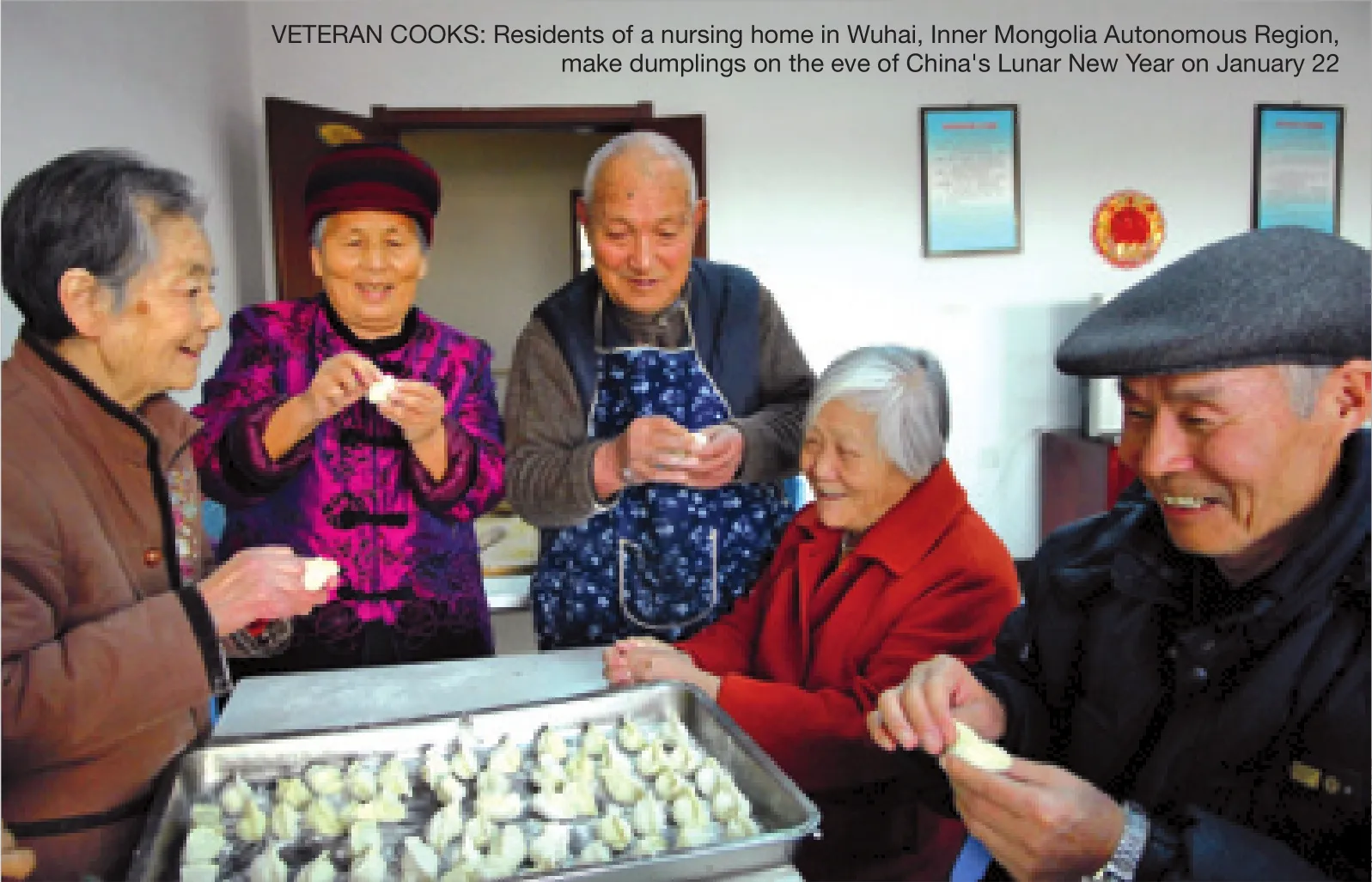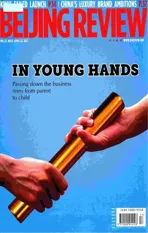Happy Aging
2012-10-14CaringfortheelderlyneedsmoreinvestmentbetterstructureandnewideasByLiLi
Caring for the elderly needs more investment, a better structure and new ideas By Li Li
Happy Aging
Caring for the elderly needs more investment, a better structure and new ideas By Li Li
Zhang Yinsheng used to believe that aging was about feeling the staircases in his building growing longer as he climbed them. Having lived in an apartment next to Beijing’s Third Ring Road with his wife for decades, he didn’t realize the urgency of moving to a nursing home until a kitchen fire broke out two years ago. After cooking lunch for his wife and himself, Zhang forgot to turn off the gas,which resulted in a small fire that burned the vent hood and scared the neighbors.
“Seeing the fl ames, I was really terri fi ed. It suddenly dawned on me that leading an independent, peaceful retired life with my wife was no longer within my capacity,” Zhang, 90, who now lives in a nursing home in Beijing’s suburbs, told newspaperThe Beijing News.
Shortly after the kitchen fire, Zhang’s wife, two years his junior, was injured when she was hit by a car during a morning stroll.Two of Zhang’s four children who live in Beijing had to increase the frequency of their visits from weekly to daily to take care of their mother for half a year. “They are both senior citizens themselves with silver hair and wrinkled faces,” said Zhang. “It pained me to see them climbing the stairs with dif fi culty.”
Then Zhang started to looking for a nursing home, which turned out to be a difficult and lengthy process.
According to government statistics, by the end of 2011 Beijing had 401 nursing homes for the elderly, of which 215 were public and 186 were private, providing a total of 69,000 beds.
Zhang’s children preferred public nursing homes not only because they are more affordable but also because they are generally located close to the city center making visits more convenient.
However, all the public care providers Zhang called told him that they had no spare beds and that he had to register on a waiting list. The waiting list for one nursing home was a staggering 7,000 people, which the institution could only process in 10 years.
After losing hope of being admitted to a government-subsidized institution, Zhang had to go down the private route. There are two kinds of private senior homes in Beijing, expensive urban ones with the facilities of star-rated hotels and suburban ones with modest facilities, and sometimes without their own clinics or doctors.
After fi nding that the urban senior homes cost between 5,000 yuan ($794) and 30,000 yuan ($4,762) per month, Zhang and his wife,with monthly pensions totaling less than 7,000 yuan ($1,111), eventually moved into a room of less than 20 square meters in a suburban facility. They pay monthly fees of 2,300 yuan($365) per person.
Just as the old couple was getting used to being disturbed at night by the cries of a man with dementia living in the opposite room,they heard a piece of unsettling news: the facility was going to be moved.
The land rented by the nursing home owner had been purchased by a commercial real estate developer, which plans to build a residential apartment on the site.
A number of nursing homes in Beijing have been forced to move or even close following the expiration of their land lease contracts.
“We weren’t even able to find peace,even in the suburbs. We are too old to move again,” Zhang said.

AGE-DEFYING MOVES: Residents of a nursing home in Zouping, eastern Shandong Province,learn to dance in July 2011
As the most populous country in the world, China is also the only country with a senior population of more than 100 million. At a national conference on caring for the elderly on March 1, the Ministry of Civil Affairs announced that by the end of 2011 China had 185 million people 60 years of age or older, constituting 13.7 percent of its total population. The ministry also estimated that in four years the population of the elderly will grow by more than 43 million to 221 million,including 24 million 80-year-old or older.
For hundreds of years, the ideal family model in China was four generations under one roof. In these close-knit large families,the responsibility of caring for the elderly fell on the shoulders of younger family members.However, with an increase of nuclear families, and following the implementation of the family planning policy, this structure of caring is no longer viable in many cases.
“Our population structure makes it inevi-table that caring for the elderly will become an enormous social burden. For the next two decades, a growing proportion of elderly people will have just one child, which means that each young couple has to take care of four elderly parents while raising their own children and having a career,” said You Jiangyun,Doctor of Medicine.
According to You, facilities at China’s nursing homes are insufficient to cope with the inevitable demand, and there aren’t enough quali fi ed caregivers in the country.
“It is an urgent social task to raise the general level of care for the elderly,” You toldScience and Technology Daily.
According to a recent survey conducted byThe Beijing Newsof 1,231 respondents, 87.2 percent are not satisfied with the benefits and services enjoyed by the elderly. About 81.4 percent of respondents cited insuf fi cient government investment as the main cause of the present situation and 74.6 percent complained that there were too few public nursing homes.
Yao Yuan, a professor of School of Sociology and Population Studies of Renmin University, toldPeople’s Dailythat the government should increase its subsidies to private nursing homes to allow them to lower their prices.
Huichen Seniors Community is the first public nursing home in Beijing that was built by the government and is managed by a bid winning company. Zhou Liming, general manager of this facility, said that more facilities should be established along public-private lines to avoid conflicts over land and offer lower prices to potential residents.

ZHANG CHAOQUN
Thinking out of the box
You is a physician as well as one of the main designers of China’s first online hospital mainly targeted at the elderly, which was launched in Beijing in April.
Elderly Web surfers can register as members and create their digital medical records and consult a geriatrician 24 hours a day via webcam,online chat or email after paying fees. A terminal downloaded to cell phones enables elderly users to report physical discomfort immediately to a family doctor appointed by the website through a video chat and the doctor will appoint a face-toface check-up if necessary.
The online hospital, which has access to the medical resources of specialists and veteran geriatricians from large research hospitals, also provides long-distance training for staff of nursing homes. Specialists and geriatricians can also conduct live tele-consultations with nursing home residents and seniors who live at home on this platform. Such services are free of charge for poor senior citizens in rural areas.
“By launching this website, we expect to dramatically boost the occupancy rates of nursing homes and improve the medical care enjoyed by elderly people living at their homes while alleviating burdens of their children,” said You.
In Shanghai, Zhang Jun, a young man returning to his home city after studying in Japan, has found a niche market in providing medical-related care to middle-income elderly people.Setting up a company of 10 people, Zhang now hires one general practitioner, who assesses the general health conditions for clients, and eight nurses and therapists.Zhang expects his caregivers to be in the middle between domestic helpers and professional nurses in terms of medical knowledge and know how to prevent bed sores for bedridden patients, exercise facial muscles for those with difficulty in swallowing to prevent choking and measure blood pressure.
He discovered this business opportunity when he saw that many elderly people chose to stay in crowded hospital wards when it was clear that they really needed long-term care.
Although Zhang’s clients are charged 60 yuan ($9.5) to 120 yuan ($19) per hour for the care, considerably higher than regular maid services, the company still struggles to make ends meet.
“If basic medical insurance can cover some of the home care items we provide, I am sure we will have more customers,” Zhang toldXinmin Evening News.
Another development hurdle identi fi ed by Zhang is how to attract young people to join him. The average age of Zhang’s employees is above 40 years. “Domestic caretaker for the elderly is not a recognized profession, which impedes young people’s participation in this industry. I hope with the accelerated population aging in China this could change in the near future,” Zhang said.
